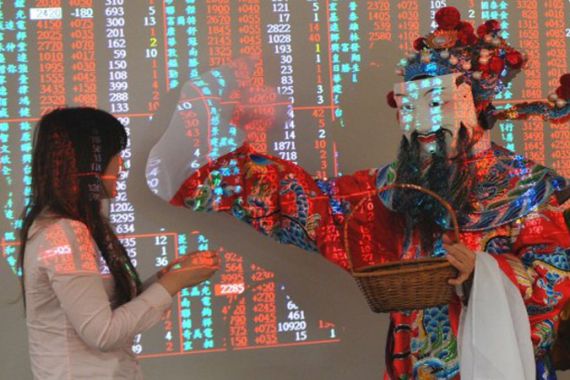China’s ‘soft power’ offensive in Taiwan
Has China learned that threatening Taiwan may not be the best way to achieve unification?

 |
| Trade with Taiwan and making the Taiwanese people feel richer is China’s new strategy [AFP] |
Tokyo, Japan – China’s behaviour during the recent presidential election in Taiwan demonstrates that its leaders have learned some lessons, if only the hard way. They have learned that China can have a greater impact on Taiwanese voters through trade and making people feel richer than by threats – even threats to fire missiles – which had been China’s electoral tactics in previous Taiwanese elections, particularly when a pro-independence candidate looked popular enough to win.
Indeed, fearing the popularity of Lee Teng-hui, who ran in the 1996 presidential election on a pro-independence platform, China’s People’s Liberation Army actually fired missiles close to the nearby coast of Keelung. But this sabre rattling backfired. Lee won.
The presidential election on January 14 was the first of the transfers of power in China and Taiwan that will take place this year. Later this year, China’s President Hu Jintao and Prime Minister Wen Jiabao will be succeeded by men chosen by the Communist Party long ago. Avoiding new tension with Taiwan appears to have been a calculated decision by China’s leaders as they begin their own – perhaps not yet fully settled – changing of the guard.
For almost two decades, Taiwan’s presidential elections have attracted global attention not only for the robustness of Taiwan’s democratic culture, but also for the perennial question of whether the winner would seek formal independence for Taiwan. This time, Tsai Ing-wen, the woman nominated by the opposition Democratic Progressive Party (DPP), mounted a late charge on the Kuomintang incumbent, Ma Ying-jeou. But China did not bluster as Tsai surged in the polls.
Instead, China did all that it could do boost Ma, who has presided over a massive increase in economic ties with the mainland. For example, China provided cheap airplane tickets to roughly 400,000 of the one million Taiwanese living on the mainland to enable them to return home to vote. Given that Ma won by 800,000 votes, this tactic may not have been decisive, but it most likely played a considerable part in determining the outcome.
Paradoxically, the strong performance of James Soong Chu-yu of the People First Party, which split from the Kuomintang, helped Ma by giving voters a second alternative. And the US’ quiet instructions to all candidates to avoid nationalist provocation undoubtedly also played a role in dampening tension with China – another factor that probably benefited Ma.
As part of China’s new “soft” approach to Taiwan, Wen emphasises “conceding interests” to Taiwan. In Taiwan’s south, long a DPP stronghold, that approach appears to have paid off. The Economic Co-operation Framework Agreement (ECFA) between China and Taiwan has enabled farmers and fishermen in southern Taiwan to prosper by selling agricultural and fisheries products to the enormous Chinese market, and the Kuomintang received higher support in the region than in past elections.
China’s five policies
Of course, promoting economic interaction with Taiwan is not China’s ultimate goal; unification is. China’s government appears to believe that Ma’s victory is a step in this direction.
But economic integration is one thing, and political integration quite another. After experiencing the benefits of democracy and freedom of expression, the Taiwanese are unlikely to want to settle for anything less than the open society that they have today. Indeed, with increased contact between Taiwan and the mainland, ordinary Chinese could begin to envy the modern democracy that the Taiwanese people have built – and spread the idea of an open society to the Chinese mainland. Ma’s role in his second term should be to serve as just such an evangelist for democracy in China.
Well aware of this “danger”, China is implementing five policies. The first is to expand the ECFA, so that more Taiwanese companies feel its benefits. Second, and similarly, China will try to shake up the DPP’s base by further targeting the commercial interests of Taiwanese farmers and fishermen in the south. Third, China will emphasise common Chinese culture in order to reduce Taiwanese fear of unification. A fourth goal is to win over young legislators elected during this presidential election. Finally, China will seek to prevent the use of the name Taiwan and force the international use of the awkward name “Chinese Taipei”.
But the greatest issue affecting cross-strait relations is the Chinese economy itself. Signs of decline in China’s economy, which has racked up double-digit growth for decades, would affect all of its Taiwan policies. When Shanghai stocks fell by about 20 per cent last year, Taiwanese stocks fell by a similar amount almost simultaneously – proof of how synchronised the Chinese and Taiwanese economies have become. China will not be able to get its way if the profitability of this synchronisation breaks down.
So, will Taiwan become more like the mainland, or vice versa? To ask that question is to reprise a debate that was heard when Hong Kong and Macau reverted to China, but that is seldom encountered nowadays. Whether serious moves toward unification change that fact will depend on the effectiveness of China’s soft-power approach, which cannot be limited only to the attractiveness of its economy if it is actually to succeed.
Yuriko Koike is a former Minister of Defence and National Security Adviser of Japan.
A version of this article was first published on Project Syndicate.
The views expressed in this article are the author’s own and do not necessarily reflect Al Jazeera’s editorial policy.
